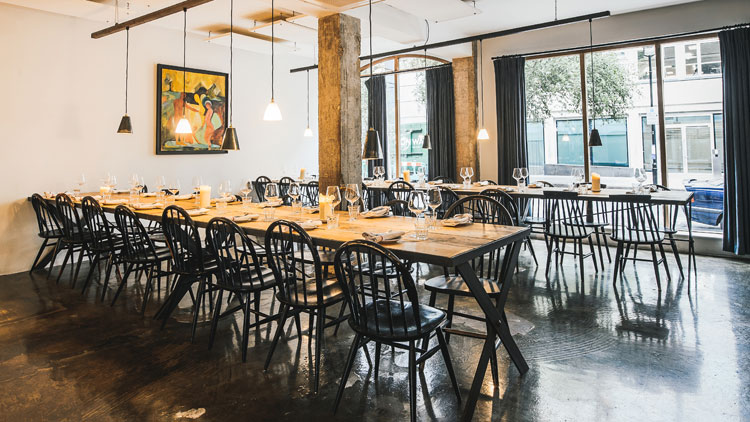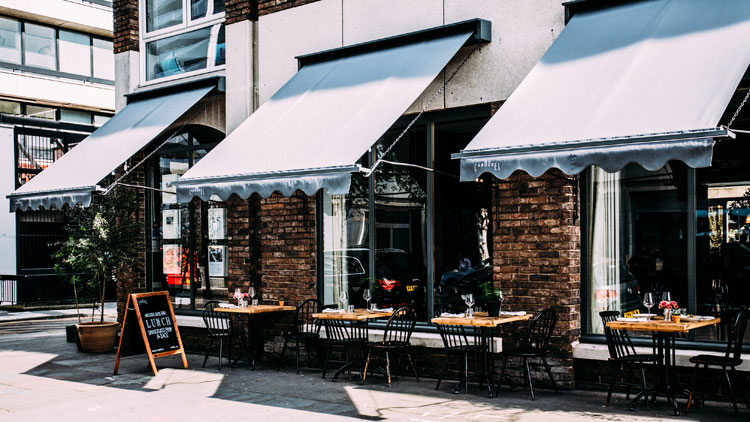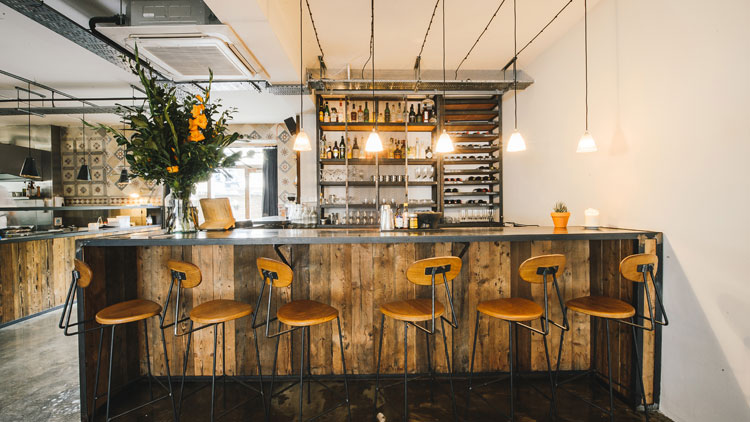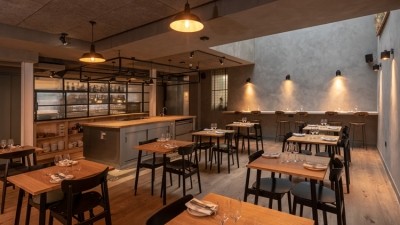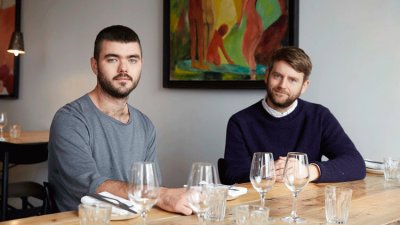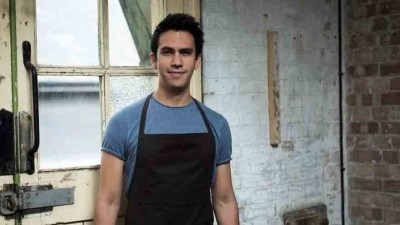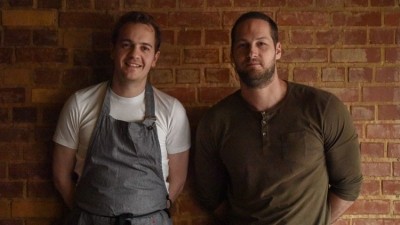The magic roundabout: five years of Carousel
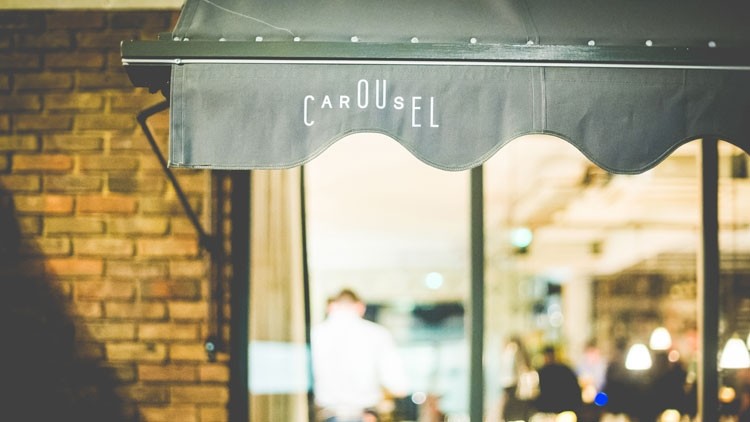
How did the idea for Carousel come about?
Ollie: We were working together as four cousins doing pop-ups when this building came along. It wasn’t exactly what we were looking for, but it was way too exciting a proposition to ignore. We had collaborated with chefs in the past – we did a boxing-themed event called Rumble in the Deli where two chefs had to make a dish using the same ingredients and guests scored their meal like a pimped-up Ready Steady Cook, so we knew it was a popular idea. I was 21 at the time and the idea of opening a restaurant and saying ‘this is my food’ didn’t feel like what we should be doing right now. So instead we created a guest chef series – we came up with the idea in the middle of the build. We wanted to break down the barriers of what a normal restaurant experience is. That is still at the heart of what we do today.
That doesn’t sound easy
Ed: The first 12 to 18 months were really challenging. It’s still not easy and takes a lot of thought in terms of the chefs and planning for the time of year and what ingredients will be available. We are constantly challenging ourselves to be better.
Ollie: A lot of people didn’t appreciate that we were a permanent presence here and had an input in terms of chefs and the vibe. That took a while for people to understand.
Ed: But now we have some super regular customers, one person has been 70-plus times since we opened. A lot of people live locally. It’s quite an unconventional local restaurant but they like that it’s new every time. On any given night maybe half the people have been at least a couple of times before.
How does Carousel work?
Ollie: A chef residency usually lasts for on average one or two weeks, depending on how far they have travelled. It’s one sitting five nights a week, with tickets sold in advance. Chefs must prepare a minimum of four or five dishes, but they can do a sharing menu if that’s their style of food. As long as people leave full and happy, that’s fine. We publish their menus in advance to hook people in, it’s not a secret.
Ed: There’s 46 seats – when we opened we did 50, but we’ve reduced it to make it a bit more comfortable.
Ollie: There are other rules. Chefs have to use seafood from the UK, meat from UK and definitely have to be working with produce from our farm. We guide the chefs on what our best produce is for time of year, talk them through what they are like, and work with them on putting the menu together. We want to see how their food and philosophy translates using the majority of ingredients from the UK.
Do you pay the chefs for their time?
Ollie: No. We sort their flights out and put them up but chefs tend to do it for the promotional value. These days when we travel we don’t ask for money for events we cook at. The chefs are passionate about cooking and understand the value of creating a great relationship with others, and they enjoy travelling. For a chef from wherever, coming to cook in London is quite a cool thing to do. And we take the stress out of it for them. Everything is sorted; they come into a working system with a great support network. And when they are here, we make sure they have a great time, too.
Ed: It was key for us at the beginning to establish a set framework that still gives people room to bring their ideas but which means that Carousel works as well for a chef coming from South Korea as it does for someone from France. We’ve got a structure that means we are not reinventing our kitchen every week.
Do they ever bring their own produce over?
Ollie: The team from restaurant 1877 in Bergen brought two suitcases full of mahogany clams with them because we couldn’t get hold of them over here and were a key part of their signature dish. One got confiscated but the other made it. Another chef then came halfway through the residency to restock. We had a chef called Oswaldo Oliva from a restaurant called Lorea in Mexico City cook for us. He had been a development chef at Murgaritz and used lots of interesting ingredients – he sent us bags of ominous-looking white powder in the post. The dry store at Carousel now is pretty ridiculous, it’s full of bizarre ingredients I’d never heard of.
Who was the first chef at Carousel?
Ollie: A chef called Javier Rodríguez. He was opening his restaurant in Córdoba in Argentina called El Papagayo and had cooked at Viajante. He got the ball rolling.
Has it become easier to find chefs?
Ollie: Because we’ve been doing it for so long the network of chefs we’re able to dip into has grown and people know who we are now, so it has become a lot easier. You realise there’s two degrees of separation between nearly every restaurant we’ve ever invited. We’re now able to work out the right mix between big restaurants and emerging young chefs and make sure we strike a balance so that we get people who are interesting to the public as well as to us. And for me, it’s like an eternal stage.
How big is your brigade?
Ollie: We fluctuate between six and eight in size. Because of what we do we are able to attract great chefs and young people who are eager to learn. We’ve never had a problem staffing in a city that’s scrambling to find chefs to build their team. A chef who was with us for a year and half recently left us and has already staged in four restaurants that have done residencies at Carousel that he really enjoyed.
What has been the most memorable residency?
Ollie: The team from Sushi Sho in Stockholm. We first met them in 2015 when they came to a pop-up we did in Stockholm and they fed us. They came over the following year in the summer; they shut their restaurant and brought the whole team over. Suddenly seven Swedish dudes turned up in our small kitchen. They are all sake sommeliers as well, so they were all on the floor pouring sake. Japanese chef Toshio Tanahashi is another. He’s a Buddhist monk who’s known as the vegetable whisperer – he talks to fruit and vegetables and won’t let them be kept in the fridge because it stresses them out – and he taught us how to meditate during cooking. He cooks shojin ryori cuisine and won’t use any electric machinery – the soup was passed through a horse hair tamis he brought from Kyoto. He wouldn’t give me a menu until he arrived.
Which ones have been the most successful?
Ollie: Certain residencies fill up really quickly. Niklas Ekstedt was very popular, as was Santiago Lastra, and Angie Mar from The Beatrice Inn in New York. Anything remotely Japanese also does really well, like Ju-Ni sushi restaurant in San Francisco. It’s not always the big names, either. It varies. It’s not hard to fill most of them: we run at a minimum of around 80% capacity.
And the hardest?
Ollie: Those are the ones where the prep seems to never end. Once we were still skewering sea snails at 6pm on the first day of a residency and had to face the fact we had two more weeks of it – those are the character-building ones. Leonardo Pereira did an out-there menu where every dish was seriously hard. And Santi’s [Santiago Lastra’s] food has so many ingredients and so much to prep – we once spent a whole Sunday drying milk skins. It’s good to sometimes be really pushed and other times be the ones doing the teaching – it’s a really nice balance. When we see the prep list, we know whether it’s going to be hard or not. We had a chef from Korea who sent us a very in-depth recipe for kimchi that we had to get ready in advance.
Have you had any disasters?
Ollie: In the first year Lee Skeet had to have his appendix taken out and we had to close. His appendix exploded. He was texting from hospital saying he’d be back in the next day, but we told him he wouldn’t so we had to shut. Karlos Ponte, who cooks Venezuelan food at Taller in Copenhagen, was denied entry at the airport two days before he was due to cook. We had sold out two weeks and had spent £2,000 on lobsters. We contacted people and offered them a refund or said they could come along, and we’d cook. About half the people came anyway – we’re more than capable of making really good food so it worked. If it was always plain sailing it would be a bit boring.
And any that just didn’t work?
Ed: They’ve all been successful but the one that sticks out was when we got a Macanese chef to come over. On paper Macanese food, which has Portuguese and Chinese influences, sounds amazing and what [Portuguese-Chinese couple] Ana Gonçalves and Zijun Meng do at Tata Eatery is unbelievable so we thought it would be great. She cooked some traditional Macanese food, but it didn’t go down very well with the guests.
Who have you asked but has said no?
Ollie: Yardbird in Hong Kong. We also asked Danny Bowien from Mission Chinese in New York but he didn’t want to do it.
Ed: It’s quite self-selective. Some people we just don’t hear back from. We don’t want chefs whose agent has told them to go and do a gig somewhere, we want people to be enthusiastic about coming to London and be really passionate about it. We ask the chefs to introduce themselves on the night and some are still there 20 minutes later giving diners their life history.
Who do you want but have yet to ask?
Ollie: We’d love to have René Redzepi – so far, we’ve just asked all of his alumni to come instead. And David Thompson would be great. Nuno Mendes is doing a week with us soon cooking Goan/Portuguese food; he’s someone we’ve wanted to work with from the very beginning.
What does the future hold for Carousel?
Ed: As long as there are interesting chefs out there doing interesting things it could run and run. We’re starting to do more pop-ups abroad ourselves and residency exchanges and that side of things is evolving. We might not be in this building because we don’t have it forever. It was on a short lease, which was how we got in in the first place, and it’s rolled over a couple of times already. We definitely have ambitions to find a new permanent home for the restaurant and other events and workshops. Maybe in the future there could be more than one Carousel, one a bit more of a test bed where someone has two or three months as a kind of launchpad to open somewhere more permanent, while another one would be more like the original for more established people. When you take the idea of the community of different chefs there are so many different things you can do with it. I don’t see it running out of steam.
This is a web version of an article that first appeared in the November issue of Restaurant magazine, the leading title for the UK's restaurant industry. For more features, comment, interviews and in-depth analysis of the restaurant sector subscribe to Restaurant magazine here.
